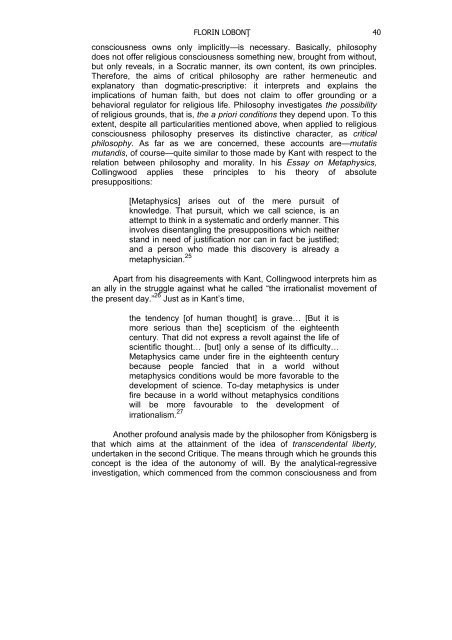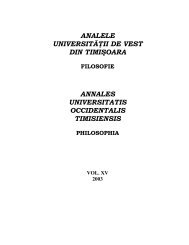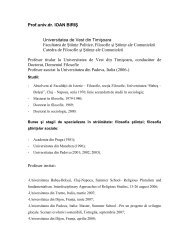VOL. IV (XXI) 2009 - Departamentul de Filosofie si Stiinte ale ...
VOL. IV (XXI) 2009 - Departamentul de Filosofie si Stiinte ale ...
VOL. IV (XXI) 2009 - Departamentul de Filosofie si Stiinte ale ...
You also want an ePaper? Increase the reach of your titles
YUMPU automatically turns print PDFs into web optimized ePapers that Google loves.
FLORIN LOBONŢ 40<br />
consciousness owns only implicitly—is necessary. Ba<strong>si</strong>cally, philosophy<br />
does not offer religious consciousness something new, brought from without,<br />
but only reveals, in a Socratic manner, its own content, its own principles.<br />
Therefore, the aims of critical philosophy are rather hermeneutic and<br />
explanatory than dogmatic-prescriptive: it interprets and explains the<br />
implications of human faith, but does not claim to offer grounding or a<br />
behavioral regulator for religious life. Philosophy investigates the pos<strong>si</strong>bility<br />
of religious grounds, that is, the a priori conditions they <strong>de</strong>pend upon. To this<br />
extent, <strong>de</strong>spite all particularities mentioned above, when applied to religious<br />
consciousness philosophy preserves its distinctive character, as critical<br />
philosophy. As far as we are concerned, these accounts are—mutatis<br />
mutandis, of course—quite <strong>si</strong>milar to those ma<strong>de</strong> by Kant with respect to the<br />
relation between philosophy and morality. In his Essay on Metaphy<strong>si</strong>cs,<br />
Collingwood applies these principles to his theory of absolute<br />
presuppo<strong>si</strong>tions:<br />
[Metaphy<strong>si</strong>cs] arises out of the mere pursuit of<br />
knowledge. That pursuit, which we call science, is an<br />
attempt to think in a systematic and or<strong>de</strong>rly manner. This<br />
involves disentangling the presuppo<strong>si</strong>tions which neither<br />
stand in need of justification nor can in fact be justified;<br />
and a person who ma<strong>de</strong> this discovery is already a<br />
metaphy<strong>si</strong>cian. 25<br />
Apart from his disagreements with Kant, Collingwood interprets him as<br />
an ally in the struggle against what he called “the irrationalist movement of<br />
the present day.” 26 Just as in Kant’s time,<br />
the ten<strong>de</strong>ncy [of human thought] is grave… [But it is<br />
more serious than the] scepticism of the eighteenth<br />
century. That did not express a revolt against the life of<br />
scientific thought… [but] only a sense of its difficulty…<br />
Metaphy<strong>si</strong>cs came un<strong>de</strong>r fire in the eighteenth century<br />
because people fancied that in a world without<br />
metaphy<strong>si</strong>cs conditions would be more favorable to the<br />
<strong>de</strong>velopment of science. To-day metaphy<strong>si</strong>cs is un<strong>de</strong>r<br />
fire because in a world without metaphy<strong>si</strong>cs conditions<br />
will be more favourable to the <strong>de</strong>velopment of<br />
irrationalism. 27<br />
Another profound analy<strong>si</strong>s ma<strong>de</strong> by the philosopher from Königsberg is<br />
that which aims at the attainment of the i<strong>de</strong>a of transcen<strong>de</strong>ntal liberty,<br />
un<strong>de</strong>rtaken in the second Critique. The means through which he grounds this<br />
concept is the i<strong>de</strong>a of the autonomy of will. By the analytical-regres<strong>si</strong>ve<br />
investigation, which commenced from the common consciousness and from




